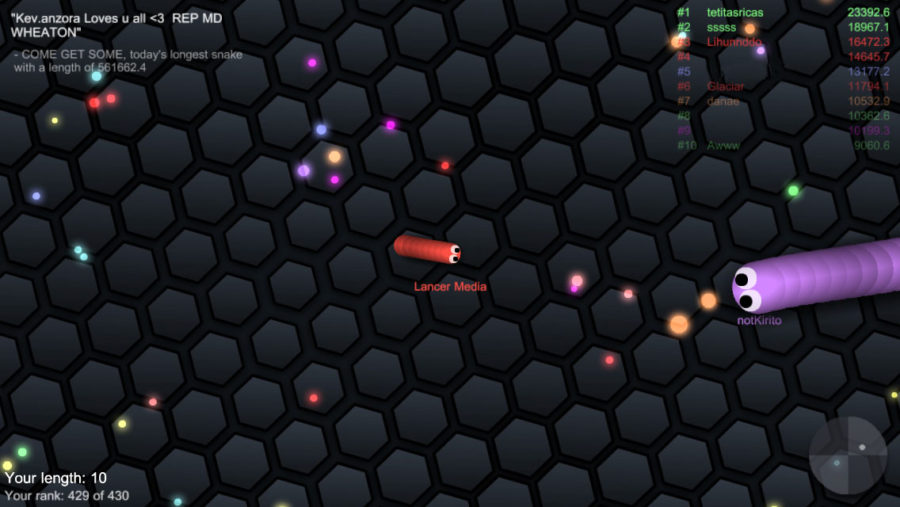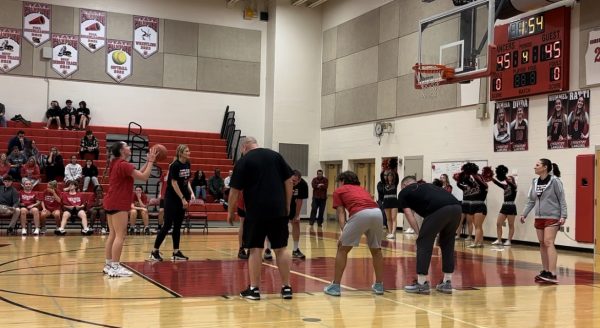Slide on over to the Web Store to play Slither, just not in school
May 12, 2016
It seemed like everyone in Linganore was slithering into the computer labs to play Slither in April after its release.
Slither.io was developed by Steve Howse in 2016, and by early May, it was in the App Store at number 2 Top Free Apps. For Lancers, the fun ended the first week of May, when FCPS blocked access.
Slither has a very basic concept. The player starts out as a small snake. The snake eats the glowing orbs to get larger, and the objective is to be the longest snake in the game. Why is this game so addicting? How can people get so worked up over snakes running into each other? Besides the opportunity to make a creative username for your snake. People like it because there isn’t much skill required to play this game.
Slither.io is very similar to the 2015 hit game Agar.io. Created by Matheus Valadares, Agar.io is a game in which the player is a cell, trying to become the largest one in the multiplayer server.
In order to get larger, the cell needs to eat smaller randomly generated multi-colored dots. However, if you’re eaten by a cell larger than you, then you die and, you have to start all over.
“It’s gets addicting because you want to be the best on the leader board and beat everyone,” said sophomore Cameron White.
There are plenty of games that students can access through their Google Chrome FCPS accounts, but these two are now blocked.
“Yes,I am,in fact, familiar with Slither I have a 5-year-old that loves it. I didn’t know that the game’s popularity has trickled all the way up to high school,” said Derek Root Director of Technology Infrastructure for FCPS.
FCPS has a system in which websites are monitored software provided by a private company. The websites that are deemed inappropriate by the software are blocked, such as websites that include violence, pornography, or other material that isn’t beneficial to students in a school setting.
This software,which refreshes daily, acts as a filter blocking out unnecessary applications.
Schools can also request for some websites to be blocked based on usage history. If many students visit a website that is not primarily used for school purposes, a school’s technology coordinator can request that this site be blocked from student access.
However if the software blocks a website needed by a teacher or another faculty member, Root can white list the site, meaning that the website will be removed from program’s blocked website list. With no real educational purpose, Slither will remain blocked.
“My decision ultimately can override any website blocked by the hardware,” said Root.
While this game is blocked, some teachers do use games as a reward after completion of regular classwork.
“I personally don’t believe in ‘rewarding’ the students for doing something that should already be done. FCPS has policies against playing games on school computers,” said Stefanie Roberts, LHS Tech Coordinator.














Averie • Jan 8, 2024 at 6:19 pm
Is there Any wolf games on here? I just got on here. Thanks.
alyssa • Dec 12, 2020 at 11:12 pm
On google i look up slither.io to play the game but it said website access prohibited and i did not know what was going one but i just hated it so much i do not know why it was not working and i was so happy to play this game but no all the other times it worked but i do not know what is going on with it i guess it just can not work that’s why i came to this.
Adya • May 9, 2020 at 12:18 am
It’s an amazing game, but it keeps GLITCHING!!!!!😡
I HATE it when it glitches cause I enjoy playing it a lot. Please
make the game not glitch. If you want me to rate it from before i’d rate
it 5 out of 5. But now, since its starting to glitch I rate it a 1 out of 5.
I’m sorry but change the glitch. And don’t you dare say it’s my computer’s
problem because I already checked and it isn’t.
Please change it.